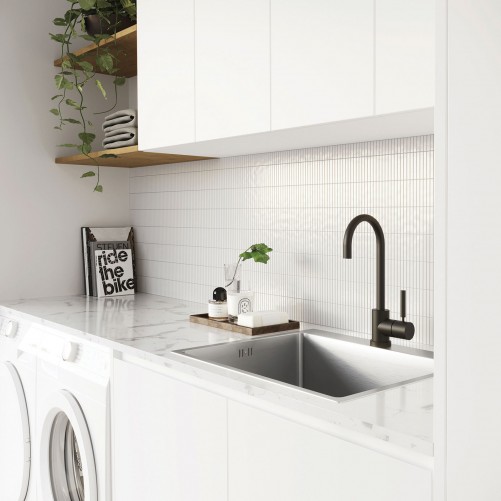Login
Don't lose your
products.
Create an account to save your wishlist.
Day to Day Care
After use, wipe the stainless steel sink surface with a soft damp cloth and rinse with water. In hard water areas, an application of Inox will help avoid any build-up of waterborne deposits. Although Stainless Steel is an extremely durable material and will withstand a great deal of heavy use, it can be scratched by hard or sharp objects. To keep the surfaces blemish free condition, reasonable care should be taken when handling such items.
Cleaning
Always use a soft cloth. The use of coarse grit, scouring powders or soap filled wire wool cleaning pads is not recommended, both will mark the stainless steel surface. Wire wool pads leave tiny fragments of wire embedded in the surface and these can rust and leave small brown rust stains. Vigorous rubbing with a soft cloth and neat detergent will remove these stains. Always remove wet cleaning aids (cloth, containers etc) from the surface after use in order to avoid the formation of water marks.
Caution
Certain household products contain substances which will damage the Stainless Steel surface, they are:
- Bleaches:
Most common domestic bleaches contain Chlorine in the form of hydro chloride. Chlorine attacks the Chromium Oxide film on the surface and can cause pitting. Undiluted bleaches can cause surface pitting and staining. Bleach should be immediately rinsed off with plenty of water. All cleaning agents containing hydro chloride are unsuitable for use with stianless steel, even highly diluted these can cause pitting. It is strongly recommended that the sink is not used for soaking or cleaning clothes in hydrochloric solutions. - Chemical Storage:
Chemicals including hydro chlorides should not be stored in the cabinet under your sinkware. Even closed containers leach corrosive vapours. Your bowl will be damaged, this will affect your warranty. - Silver Dip Cleaners:
These are particularly harmful since they contain strong acids which can cause discolouration and pitting. The first sign of this is an iridescent rainbow stain which turns an etched dull grey colour. Should any Silver Dip Cleaner come into contact with the surface of the stainless steel it should be immediately rinsed off with plenty of water. - Corrosive Foodstuffs:
Fruit juices, damp salt, vinegar and ready-made mustards, pickle and mayonaise can cause pitting and corrosion if left in contact with the stainless steel surface. - Acids:
Sulphuric, Hydrochloric and other strong acids will cause pitting corrosion, as will photographic developing liquids. All should be immediately washed off with plenty of water if contact occurs.
Installation
It is a requirement that all undermounted sinks be installed by a professional or qualified benchtop manufacturer. Failure to do this will void the warranty. All templates are supplied only as a guide. The physical use of the sink will ensure a more accurate cut-out. For information on installation instructions for solid surface, granite, marble, stone or engineered countertop surfaces, contact your fabricator or benchtop manufacturer.
